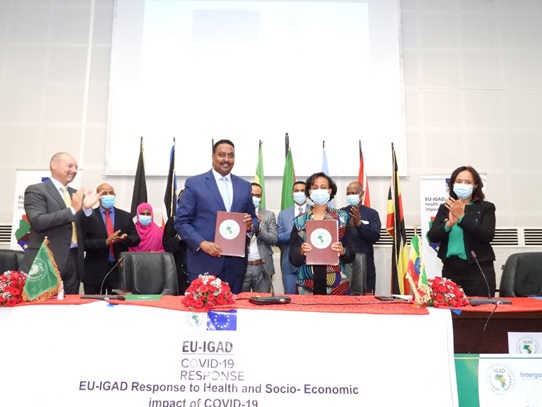
The outbreak of the COVID-19 pandemic signaled strong cooperation and interaction among the international community since its inception. Different experts underscored that the pandemic was a wake-up call to the international community to work in collaboration in the fight against pandemics that affect everyone without discrimination.
It is a recent phenomenon that we witness countries compelled to close their doors to foreigners and announce continuous travel and trade bans. This situation has led to an exacerbating global socio-economic crisis. At the time, global economic experts have been insisting leaders of countries to choose cooperation other than travel and trade ban.
Following the COVID-19 pandemic, a new chapter of partnership paves the way to fight global pandemics together. The pandemic has now easing following the active engagements of the governments, international institutions, and the international community at large.
The European Union (EU)-Intergovernmental Authority on Development (IGAD) response to health and socio-economic impact of COVID-19 pandemic in the IGAD region is among the leading partnerships that play significant roles towards fighting the impact of the pandemic. Recently, the EU-IGAD partnership handed over three ambulances, mobile laboratory, nitrile gloves, and other COVID-19 protective equipment to the Ministry of Health of Ethiopia.
On the handing over ceremony held at the Ethiopian Public Health Institute (EPHI), IGAD Executive Secretary Workneh Gebeyehu (PhD) said that the EU-IGAD partnership is critical not only for arresting the spread of the virus throughout the region but also safeguards livelihoods.
“The partnership also plays a fundamental role to ease the COVID-19 pandemic socio-economic impacts in the region. We’re not relenting in our fight against the pandemic by ensuring that no one is left behind”, he said.
As to him, IGAD will continue providing basic COVID-19 protective equipment to its member states towards expediting the country’s efforts of recovery from the pandemic. A trilateral Memorandum of Understanding (MoU) was signed between the Ministries of Health of Ethiopia and Djibouti and IGAD.
Accordingly, the signed MoU addresses the access to vaccine in general and the vaccination of COVID-19 vaccine for cross-border truck drivers in particular between Ethiopia and Djibouti. In addition, MoU was signed between Ministry of Health, University of Gondar, Jigjiga University, and IGAD for research and surveillance and Risk Communications and Community Engagement (RCCE) in cross-border areas.
On her part, Health Minister Dr. Lia Tadesse, said that undertaking effective regional COVID-19 protection helps to maintain safe cross-border travel and trade. New and existing partnerships among member states, IGAD, and the EU is very crucial to facilitate the on-going responses to the pandemic. The partnership also enables member states to offer latest health services to the communities, according to her.
Accordingly, the EU-IGAD COVID-19 Response programme delivers supplies to the Ministry of Health and MoUs signed to facilitate activities. During the ceremony, three ambulances, mobile laboratory and nitrile gloves were handed over to the Ministry of Health.
IGAD also signed a MoU handover of ambulances is part of the programme’s coordinated response to mitigate the health and socio-economic impact of COVID-19 in the region. Three ambulances, one mobile laboratory and nitrile gloves were handed over to the Ministry of Health at the Ethiopian Public Health Institute to support the Government of Ethiopia’s response to the COVID-19 pandemic. The ambulances were provided by the EU-IGAD COVID-19 Response programme. The donated ambulances will be sent to the cross-border areas of Galafi, Metema and Moyale to improve the health response in these areas and support cross-border communities and vulnerable populations during the on-going COVID-19 pandemic.
A MoU was signed between the Ministry of Health of Djibouti, Ministry of Health of Ethiopia and Intergovernmental Authority on Development (IGAD). The signed MoU addresses the Access to vaccine in general and the vaccination of COVID-19 vaccine for cross-border truck drivers in particular between Ethiopia and Djibouti.
While the MoU is not directly within the scope of the EU-IGAD COVID-19 Response project, it will facilitate an activity under the project to enable the vaccination of 10,500 commercial truck drivers and their secondary contacts along Djibouti-Addis trade corridor.
An additional MoU was signed between the Ministry of Health of Ethiopia, University of Gondar, Jigjiga University and IGAD for research on surveillance and Risk Communications and Community Engagement (RCCE) in cross-border areas.
This will support IGAD’s research component under this project. The event was attended by representatives from the Governments of Ethiopia and Djibouti, programme partners and representatives of the international development community.
Funded by the European Union, the Euro 60 million, EU-IGAD COVID-19 Response programme is managed by UNOPS and implemented by the IGAD), International Organization for Migration (IOM), Trade Mark East Africa (TMEA) and The United Nations Children’s Fund (UNICEF) to provide a cohesive and coordinated COVID-19 response across the IGAD region in Djibouti, Ethiopia, Kenya, Somalia, Sudan, South Sudan and Uganda.
The programme focuses on critical cross border areas in the region and aims to enhance IGAD’s coordination capacity, increase access to health and water, sanitation and hygiene (WASH) services, combat gender-based violence, improve community engagement, ensure borders are safe for trade and promote digital health solutions. The digital health solutions component is co-funded by the German Government and independently managed and implemented by GIZ.
Overall, the programme is working in 45 sites across 7 countries, and has already delivered 8,196,321 Personal Protective Equipment (PPEs) and 208,977 COVID-19 test kits across the IGAD region. In Ethiopia, the EU-IGAD COVID-19 Response programme has already delivered 1,074,762 PPEs to protect frontline workers, border officials, cross-border communities and vulnerable populations against COVID-19. The programme has reached 864,974 people in Ethiopia through widespread activities, trained 731 people in COVID-19 prevention and gender-based violence (GBV) prevention and provided 10,240 WASH/Hygiene kits to beneficiaries.
BY TEWODROS KASSA
The Ethiopian Herald 8 May 2022





